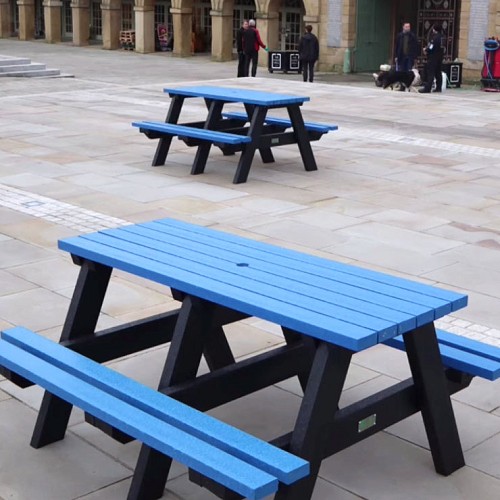Coloured Picnic Tables Revitalising The Piece Hall: Celebrating Our Tenants British Recycled Plastic

In a world where environmental consciousness is becoming increasingly important, it is refreshing to see businesses taking proactive steps towards sustainability. The vibrant and eco-friendly coloured picnic tables introduced a while back at The Piece Hall, Halifax, by British Recycled Plastic, exemplify such initiatives. At Thornber we like to champion our forward-thinking tenants who are leading the way in creating a more sustainable future.
Embracing Innovation and Recycling:
British recycled Plastic have embraced innovation by creating coloured picnic tables made from recycled plastic. British Recycled Plastic, one of the leading manufacturers in the field, has created a range of durable and vibrant tables from recycled materials. By utilising post-consumer waste, these tables significantly reduce the amount of plastic ending up in landfills or polluting our oceans.
Enhancing The Piece Hall Experience:
The new coloured picnic tables not only contribute to a more sustainable environment but also enhance the overall experience for visitors. The vibrant hues add a touch of flair and liveliness to the historic surroundings of The Piece Hall, creating an inviting atmosphere for people to gather, dine, and relax.
Durability and Low Maintenance:
One of the key advantages of the recycled plastic tables is their durability. They are designed to withstand the test of time, enduring harsh weather conditions and heavy usage. This feature makes them a perfect fit for The Piece Hall, where they can serve as a long-lasting seating solution for both locals and tourists. Additionally, their low maintenance requirements make them a practical choice, reducing the need for frequent repairs or replacements.
Environmental Impact and Sustainability:
By choosing coloured picnic tables made from recycled plastic, The Piece Hall are actively contributing to a more sustainable future. The manufacturing process of these tables consumes fewer resources compared to traditional materials, reducing carbon emissions and environmental degradation. Moreover, the decision to incorporate recycled plastic aligns with the broader goals of waste reduction.
As we applaud their efforts, let us hope that their example inspires others to follow suit, promoting a more sustainable world for generations to come.




